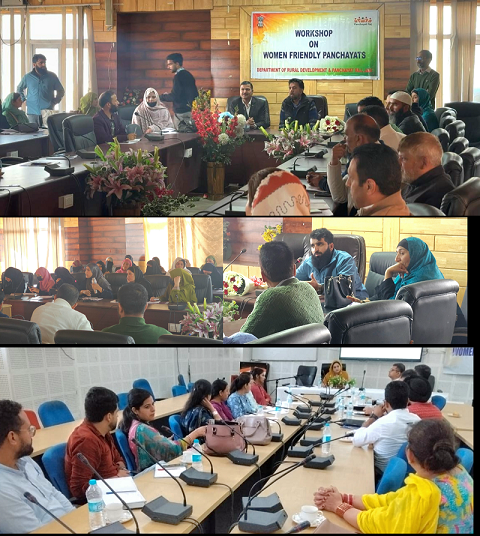SRINAGAR: Director Panchayati Raj, J&K, Sham Lal, and Director Rural Development Department (RDD) Kashmir, Shabir Hussain on friday jointly inaugurated one-day training programme on Women-Friendly Panchayats (Model Women-Friendly Panchayats).
The workshop was held simultaneously in Srinagar and Jammu for which the department has finalized 20 Model Women-Friendly Gram Panchayats (MWFGPs) across both the Kashmir and Jammu Divisions.
The initiative aims to encourage Panchayats to adopt women-centric planning, infrastructure, and governance practices, ensuring that women’s participation, safety, and empowerment remain central to local decision-making and development.
The training was designed to sensitize and build the capacity of grassroots stakeholders, including Block Development Officers (BDOs), Panchayat Secretaries, Anganwadi Workers, ASHA Workers, Block Coordinators, Self-Help Groups (SHGs), and Block Programme Managers (BPMs) on developing Panchayats that are responsive to the needs of women and children.
While addressing the participants in Srinagar, Director Panchayati Raj, Sham Lal, underscored the importance of the initiative, stating that the selected panchayats must serve as models for women- and child-friendly governance.
He urged the participants to align upcoming Gram Panchayat Development Plans (GPDPs) with key Sustainable Development Goals (SDGs) related to health, education, social welfare, and women’s empowerment.
“Your panchayat has been selected as a model, and we must ensure it truly reflects that. The focus should be on making it women- and child-friendly, aligning the GPDP with SDGs such as quality education, health, and social welfare,” Sham Lal said.
He emphasized that panchayats should deliver both tangible and intangible outcomes—from improved infrastructure to inclusive community spaces. “We must see visible changes in facilities such as schools, Anganwadi centres, and healthcare institutions. Ensuring separate washrooms for girls, promoting the pink toilet concept, institutional deliveries, and universal school enrollment for girls should be part of the agenda,” he added.
Director RDD Kashmir, Shabir Hussain Bhat, in his address, said that creating Women-Friendly Panchayats is not limited to schemes or infrastructure but involves transforming social attitudes and empowering women through education and opportunity.
He highlighted that women-friendly panchayats integrate several Sustainable Development Goals (SDGs) to build communities that are inclusive, equitable, and responsive to the needs of women and children.
“Education is the foundation of empowerment. When a woman learns, she gains the strength to progress and contribute meaningfully to her community,” Bhat said.
During the sessions, Thematic Experts from the State Panchayat Resource Centre (SPRC) and District Panchayat Resource Centre (DPRC) led detailed discussions on the concept of Model Women-Friendly Panchayats and the localization of SDGs at the grassroots level.
They explained how the 2030 Agenda for Sustainable Development offers a practical framework to link women’s empowerment with key SDGs such as Gender Equality (SDG 5), Quality Education (SDG 4), Good Health and Well-being (SDG 3), and No Poverty (SDG 1).
The experts emphasized the importance of conducting Mahila Sabhas, implementing gender-responsive budgeting, and appointing Gender Nodal Officers at the panchayat level to institutionalize gender equity in governance.
They also outlined features of a Model Women-Friendly Panchayat, including safe public infrastructure, skill development initiatives for women, effective grievance redressal mechanisms, and community awareness programs aimed at challenging gender stereotypes.


